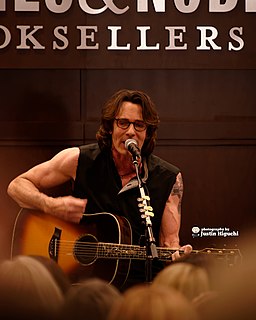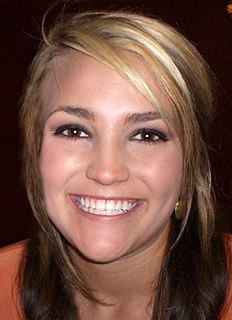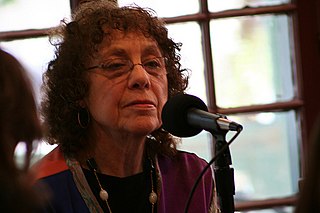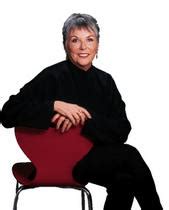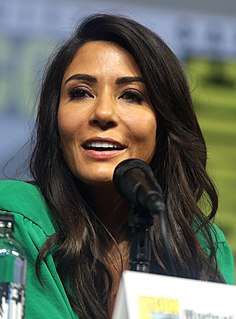A Quote by Rick Springfield
The only good grades I ever got in school before I was kicked out were for creative writing. I thought that fiction might be in my future but then my career took a different path once the Beatles showed me what a blast being in a band could be. Writing my memoir Late, Late at Night reminded me how much I love the craft. So I decided to give fiction a shot again.Magnificent Vibration is the result. I’m still not quite sure where it came from, but once I got going, it practically wrote itself. I’ve heard writers I admire speak of that phenomenon, so maybe I’m on the right track.
Quote Topics
Admire
Again
Band
Beatles
Before
Being
Blast
Came
Career
Could
Craft
Creative
Creative Writing
Decided
Different
Different Path
Ever
Fiction
Future
Give
Going
Good
Good Grades
Got
Grades
Heard
How
How Much
Itself
Kicked
Late
Love
Magnificent
Maybe
Me
Memoir
Might
Much
My Future
Night
Once
Only
Out
Path
Phenomenon
Practically
Quite
Reminded
Result
Right
Right Track
School
Shot
Speak
Still
Sure
Then
Thought
Took
Track
Vibration
Were
Writers
Writing
Wrote
Related Quotes
I had a girls' writing retreat at my condo and a bunch of other female writers came down. Me and two other writers got there before everyone and they pitched this idea to me. At first I wasn't sure what direction it was going in, but then once they kind of explained to me what they were thinking, we wrote it.
In high school, in 1956, at the age of sixteen, we were not taught "creative writing." We were taught literature and grammar. So no one ever told me I couldn't write both prose and poetry, and I started out writing all the things I still write: poetry, prose fiction - which took me longer to get published - and non-fiction prose.
There are many other writers whose work I admire tremendously, but none whose work struck me at just the right young age. Jack Vance taught me that speculative fiction, science fiction, could be wonderfully and liberatingly stylistic. It didn't have to be pulp stuff. He really changed my writing and my view of science fiction, so if nothing else, my little homage to him in the novelette I wrote for that anthology is my thank-you to him. He helped me see that any genre can have excellent writing in it.
I think all of us begin as writers. I wanted to be a writer from the time I as eight, long before I heard of jazz. The question is, once you have that obsession, what is your subject going to be and you often don't know for some time. It might become fiction, it might be non-fiction, and if it's non-fiction it can go in any number of directions.
I think that I had read so much fiction that the craft itself sort of sank into me. I didn't read any 'how to' books or attend any popular-fiction-writing classes or have a critique group. For many years into my writing, I didn't even know another author. For me, a lot of reading was the best teacher.
When I taught at the University of Houston in the Creative Writing program we required the poets to take workshops in fiction writing and we required the fiction writers to take workshops in poetry. And the reason for that is because the fiction writers seemed to need to learn how to pay greater attention to language itself, to the way that language works.
It had also been my belief since I started writing fiction that science fiction is never really about the future. When science fiction is old, you can only read it as being pretty much about the moment in which it was written. But it seemed to me that the toolkit that science fiction had given me when I started working had become the toolkit of a kind of literary naturalism that could be applied to an inherently incredible present.
The only thing that I would say to anyone doing late night shows is - it took me a couple years then - but when you leave the studio, it's over. That's what you really have to do. After a long time, I would be like, "Maybe I shouldn't have said this," or "Maybe I shouldn't have shown this." But eventually, I got to, "Ah, f - k it." That's what it was that night, tomorrow's the next night.
I came to fantasy fairly late. For some ten years, I had been happily writing fiction and non-fiction for adults. But I always loved fantasy, whether for adults or young people; and at that particular point in my life, I wanted to try it, to understand it, as part of the process of learning to be a writer. The results were beyond anything I could have foreseen. As I've said often and elsewhere, it was the most creative and liberating experience of my life.
That might work," I said. "I'm good at faking it." This led to a couple moments of uncomfortable silence from both of us. "You didn't mean... ?" Morelli asked. "No. Of course not." "Never?" "Maybe once." His eyes narrowed. "Once?" "It's all that comes to mind. It was the time we were late for your Uncle Spud's birthday party." "I remember that. That was great. You're telling me you faked it?" "We were late! I couldn't concentrate. It seemed like the best way to go.
